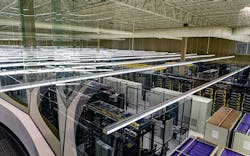Evoque Shifts into Growth Mode, Eyes Global M&A Opportunities
Evoque Data Center Solutions is ready to grow. With an experienced dealmaker as its new CEO, and the backing of Brookfield Infrastructure Partners, the company expects to be an active player in the global merger scene for digital infrastructure.
“Brookfield got into this space to use Evoque as a platform, and we think we can be significantly larger than we are today,” said Andy Stewart, who last month was named CEO of Evoque. “If everything goes to plan, 18 months from now we will probably be twice the size that we are today.”
That would be substantial growth, since Evoque currently operates 31 data centers. The company was formed from Brookfield’s 2018 acquisition of a portfolio of AT&T facilities for $1.1 billion.
With Brookfield’s backing, Evoque is likely to be a player in the continuing wave of mergers and acquisitions in the data center sector, using the AT&T assets as a platform to build for the long term. Stewart has relevant experience from TierPoint, where he implemented a roll-up strategy that assembled a network of regional data center assets through acquisition.
A Billion-Dollar Colocation Startup
Evoque is among the new players hoping to capitalize on changes in corporate IT and how it is delivered. Many enterprises are seeking to create nimbler IT infrastructure to deploy new types of applications, both for in-house and consumer apps.
It is one of several initiatives to create a data center platform from assets being shed by a large telecom player. Other efforts employing this theme include Cyxtera’s $2.8 billion deal to buy the CenturyLink colocation business, and the sale of 24 Verizon data centers to Equinix for $3.6 billion in 2017.
In the company’s first 18 months, the Evoque team focused on stabilizing its customer base through the ownership transition, and building connectivity as a carrier-neutral provider. That meant adding network providers to many data centers where the primary option has previously been AT&T.
“We’re really engaging with customers,” said Stewart. “AT&T had not shown the data centers as much love.
“Evoque is interesting because it’s kind of a startup,” he added. “We have 30 data centers, but before Evoque it wasn’t really an operating business.”
Stewart will lead the next phase of growth, and believes Evoque is positioned to grow and help enterprise customers chart their IT journey through the COVID-19 pandemic and the post-COVID future.
The Brookfield Factor
Brookfield Infrastructure Partners (BIP) is an infrastructure fund that seeks returns over a long asset life in sectors like utilities, transportation and energy. It is among the large global investors targeting billions of dollars to invest in digital infrastructure, citing extraordinary demand for capital to fuel the data economy.
“We identified data infrastructure a number of years ago as a potential sector to focus on,” said Ben Vaughan, the Chief Operating Officer of BIP, on the company’s recent earnings call. “And if anything, I think it’s emerging today as an infrastructure asset class and has only become more important as a result of this current (pandemic) situation.”
Andy Stewart, Evoque Data Center Solutions
BIP is part of Brookfield Asset Management, which manages more than $515 billion of assets. That kind of financial strength can make a difference in a company’s trajectory.“Brookfield is looking to put more capital to work,” said Stewart. “(Evoque) is a relatively small investment today, but Brookfield has capital to invest and will support an aggressive M&A strategy. Brookfield is the right type of owner for the evolution of retail colocation.”
“We are in an advantageous spot now because of Brookfield’s backing,” he continued. “The pandemic has sped up digital transformation. Not everyone in the industry has the same capital base that Evoque has. We hope this will allow us to be more competitive.”
Global Expansion Ahead?
Stewart sees international growth as an early priority. The company’s U.S. data centers are in Boston, New York/New Jersey, Northern Virginia, Atlanta, Chicago, Dallas, Phoenix, Los Angeles, Irvine, San Diego, Seattle and San Jose. International locations include London and Redditch in the UK, along with Amsterdam, Frankfurt, Paris, Bangalore, Hong Kong, Shanghai, Singapore, Tokyo and Sydney.
“One area, we’ll focus on is investing more in international markets,” he said. “Our data centers in the US were built to scale. But that isn’t the case for all of the data centers and international markets. We’re very interested in getting into other geographies, and we’ll be looking in Europe and Asia.”
That could include opportunities to acquire existing facilities through a sale-leaseback transaction, he said.
A new leadership position holds challenges for any CEO. Stewart had the additional strangeness of taking the helm during a global pandemic.
“It’s been hard because of travel limitations,” said Stewart, who was hired via video calls. “Zoom calls are fine, but in normal times I’d be flying around and visiting data centers and getting to know folks.”
He believes that after the initial economic and social shock of the COVID-19 pandemic, customers are beginning to focus on the future.
“For the first two months of the pandemic most of the enterprise customers were just hunkering down,” he said. “We’re seeing things pick up again. They’re looking for providers that can help them expand on a national or global scale.”
About the Author



